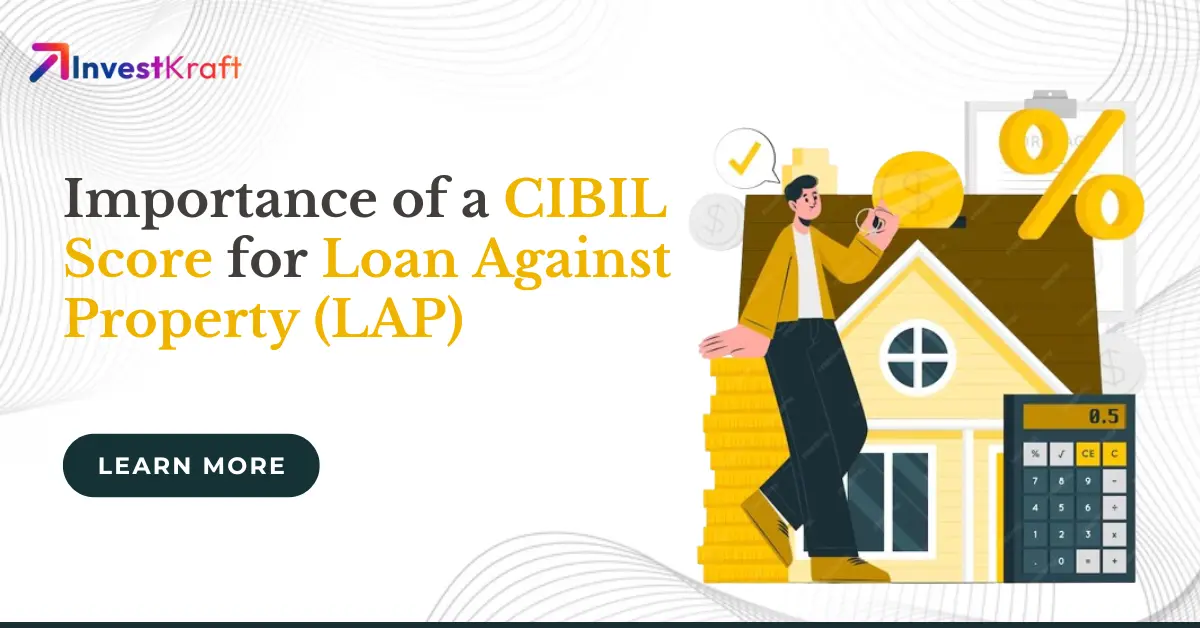Top 5 Benefits of Taking a Loan Against Property
.webp)
When faced with a financial emergency, many consider taking out a loan to obtain a significant amount. However, the process of selecting the most suitable loan product from various options available, such as personal loans, business loans or loans against property, can feel overwhelming due to its complexity.
Loan against property (LAP) is a popular financial product that is expected to reach over 708 thousand crore rupees by the financial year 2026. It is also a secured loan option that is highly beneficial if you have a good credit history and can ensure timely instalment payments. It allows you to borrow money by using your property as collateral, providing financial flexibility and potential tax benefits.
What exactly is a loan against property? And more importantly, what benefits does LAP offer? Let us delve into this and discover the numerous advantages of a loan against property.
Explaining Loan Against Property in Layman’s Terms
A loan against property or LAP is a type of secured loan in India. It involves a lender, such as a bank or NBFC, providing funds to a borrower in exchange for collateral. In this case, the collateral is the borrower’s property. The borrower pledges their property to the lender as a condition for receiving the loan, which is repaid over a specified period.
Furthermore, the lender has the authority to retain the borrower’s property documents and title until the loan is fully repaid. If the borrower fails to make payments or defaults on the loan, the lender is legally permitted to utilize the borrower’s property to settle the outstanding loan amount.
A loan against property has numerous advantages, making it a favourable choice for borrowers. If you are contemplating such a loan, these benefits will assist you in determining if it suits your financial requirements.
What is the Role of LAP in Unlocking the Value of a Property?
LAP enables you to unlock the value stored in your real estate assets by using your property as collateral. You can secure a loan at attractive interest rates and tap into the equity you have built over time. This unlocked value can be used for various purposes, effectively transforming your property into a financial springboard.
Here's how LAP helps unlock the value of your property:
- Access to Large Funds: LAP allows borrowers to access large funds by securing the loan with their property’s value. This reduces the risk for lenders and enables borrowers to fulfil their financial needs without selling their property.
- Lower Interest Rates: LAPs offer lower interest rates than unsecured loans, such as personal loans, due to their collateral. This means that throughout the loan, you can save a considerable amount of money. This advantage allows you to maximize the value of the property being used as collateral.
- Flexible Use of Funds: LAPs provide the flexibility to use the loaned amount for various financial needs, including home renovation, debt consolidation, educational expenses and even funding a business venture. This can be advantageous as it allows borrowers to address multiple financial requirements with a single loan.
- Liquidity without Selling: A loan against property offers an alternative to selling your property. It allows you to access its value without giving up ownership. This is useful if you expect the property’s value to increase over time.
Quick Checklist to Find Out Whether LAP is Suitable for You
Before opting for a loan against property (LAP), it is important to assess whether it is suitable for your specific circumstances. Here are some key points to consider when making your decision -
- Lower Interest Rates: LAPs usually come with lower interest rates as they are secured by your property, which reduces the risk for the lender. This is because your property serves as collateral, giving the lender confidence to offer lower interest rates compared to unsecured loans.
- Higher Loan Amounts: LAPs provide the opportunity to obtain larger loan amounts compared to other types of loans, thanks to the collateral that is required.
- Flexible Repayment Tenure: LAPs offer longer repayment tenures, allowing borrowers to have more flexibility in managing their monthly EMIs.
- Tax Benefits: LAPs can provide tax benefits in certain countries such as India. This includes potential tax deductions on the interest paid under specific tax sections. It is worth exploring these tax benefits if you are considering taking out a loan against your property.
- Loan Processing Fees: When considering loan against property (LAP) options, it's important to factor in the processing fees associated with the loan. These fees can add to the overall cost of the loan, so it's crucial to take them into account when evaluating your borrowing options. Be sure to carefully review the terms and conditions to understand the full financial implications of the LAP, including any associated processing fees.
- Prepayment Charges: Lenders may charge prepayment fees if you repay the loan early before the scheduled time.
- Legal and Valuation Charges: Expenses for property valuation and the preparation of legal documents are often required as part of the loan application process. It is important to be aware of these costs and factor them into your budget when considering a property purchase. These charges may vary depending on the location and specific requirements of the lender.
- Property Value: The market value of your property plays a crucial role in determining the loan amount you can obtain. Lenders usually offer a percentage of the property’s value as a loan, known as the loan-to-value ratio or LTV. This ratio can vary from 60% to 80%, taking into account both the lender’s policies and your creditworthiness.
What are the Top Benefits of Taking a Loan Against Property?
A loan against property (LAP) allows you to unlock the value of your property and access a large loan amount based on its equity, making it a valuable financial solution for different purposes. This secured loan provides several advantages compared to unsecured loans, making it a preferred choice for many borrowers. Let us explore the key benefits of opting for a loan against property -
- Attractive Interest Rates: One key benefit of opting for a LAP is the attractive interest rates it offers. Due to the secured nature of the loan, lenders consider it less risky, leading to lower interest rates in comparison to unsecured loan alternatives such as personal loans and credit cards. This can result in significant cost savings for the loan.
- Higher Loan Amounts: LAPs provide the flexibility to secure higher loan amounts, which are dependent on the appraised value of your property. This makes it an ideal option for funding major expenses like business investments, consolidating debt or managing unexpected medical costs.
- Flexible Repayment Tenure: LAPs offer flexible repayment tenures of up to 15 years. This allows for lower monthly EMIs, making it easier to manage the loan within your budget.
- Multipurpose Use: A major advantage of LAPs is their versatility. They can be used for multiple purposes such as business expansion, education costs, home renovation or wedding expenses. This flexibility allows borrowers to meet their diverse financial needs without restrictions imposed by specific loan categories.
- Potential Tax Benefits: Depending on your situation, the interest paid on the loan may be tax-deductible, providing extra financial relief. Consult a tax advisor to determine the exact tax implications in your area.
- Faster Approval Process: The approval process for a LAP is faster compared to other loans. Lenders can process the applications quickly with the right documents, ensuring you get the funds you need promptly.
- Continued Property Occupancy: One main benefit of LAPs is that you get to keep owning and using your property throughout the loan duration. This means that you can still live in your house or run your business from your commercial space while you pay them back the loan.
Conclusion
Loan against property (LAP) is a smart financial solution that allows you to leverage the value of your real estate for various purposes. With LAP, you can avail substantial loan amounts at lower interest rates compared to unsecured loans. Whether you need funds for your business or want to consolidate your debts, LAPs offer flexibility in managing your repayment through extended tenures. Discover the true potential of your property by exploring LAPs today!
Frequently Asked Questions (FAQs)
Q1: What types of properties can be used as collateral for a LAP?
A: Lenders typically accept various types of properties as collateral, including residential properties such as houses or apartments, as well as commercial properties like offices or shops. In some cases, lenders might also consider land to be an acceptable form of collateral.
Q2: Is the loan approval process for LAP quick?
A: LAP approvals are faster compared to other loans as the property valuation plays a key role in the assessment, making the process more efficient.
Q3: What are the prepayment charges associated with LAPs?
A: Be aware that lenders may charge prepayment fees for paying off your loan early, usually as a percentage of the remaining balance. Remember to ask about these penalties before signing any loan agreements.
Q4: Can I get a LAP for an inherited property?
A: Yes, you can apply for a LAP on an inherited property if you can provide legal ownership documents. Make sure to have all the necessary documentation, including inheritance records, ready for the application process.
Q5: What if I have multiple property owners (joint ownership)?
A: Joint ownership allows multiple owners to apply for a LAP, but each owner must be a co-applicant on the loan and meet the eligibility criteria. All co-applicants share equal responsibility for loan repayment.
Q6: Are there any special considerations for LAPs on agricultural land?
A: Lenders may have certain conditions regarding the type of land, its minimum area and its intended agricultural use when securing loans with LAPs against agricultural land.
Q7: What happens if the property value falls during the LAP tenure?
A: If the property value decreases, the lender may ask for more security or partial loan repayment to maintain a safe LTV ratio. This safeguards the lender’s interests in the event they have to sell the property to recoup the debt.
Q8: Is it possible to transfer an LAP to another lender?
A: Yes, LAP transfer may be possible but it depends on the terms and conditions of both lenders. There might be processing fee and other charges involved in the transfer.

Author: Abhik Das
Abhik Das is a versatile content writer with over 5 years of experience crafting engaging and informative content across diverse industries. His expertise spans the fields of ed-tech, pharmaceuticals, organic food, travel, sports, and finance.
Here's what sets Abhik apart:
Content Versatility: Able to adapt writing style and tone to suit various audiences and content needs.
SEO Proficiency: Creates content optimized for search engines, ensuring discoverability and organic traffic.
Deep Research: Conducts thorough research to ensure content accuracy and credibility across complex topics.
Engaging Storytelling: Captures reader interest with clear, concise, and compelling writing.
Abhik's diverse background empowers him to deliver insightful content across a wide range of subjects. Whether you're seeking engaging explainer pieces on the latest financial trends, informative guides to organic food choices, or captivating travelogues, Abhik has the expertise to craft content that resonates with your audience.

.webp)












.webp)
